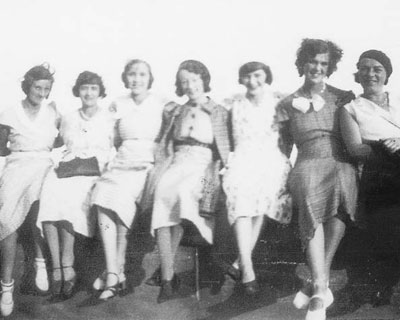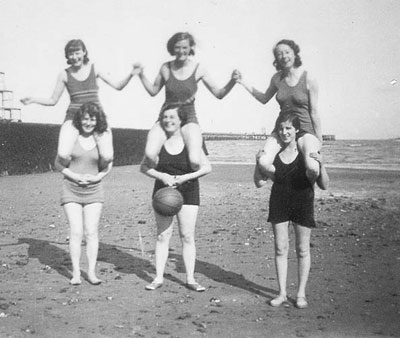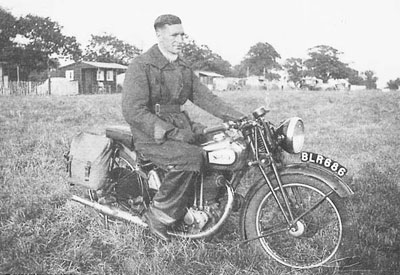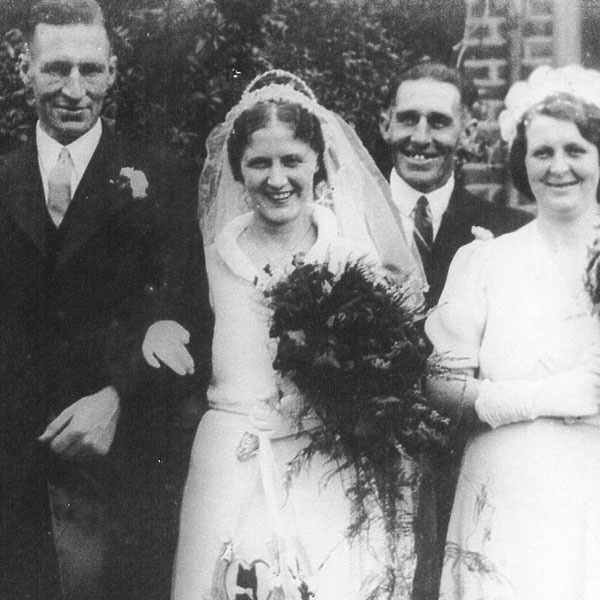Jellied Eels and Zeppelins (9 page)

Doris was marvellous at walking. I wasn’t all that sporty really. Doris was the sporty one and so was May. Doris rode a Matchless motor bike when she was 14 (she was four years older than me). The motor bike had a long red tank. She used to rev up and down our road like mad and make me roll up.
Doris was a good runner too. She won quite a few races on sports day. She always used to go nice and brown in the summer - you could always pick her out in photos. I was no good at running or walking. Cousin Flo was the runner in our family. I went to keep fit classes mostly. I was about 15 or 16 when I went to the school at Mission Grove to do keep fit. Doris would come along sometimes - when she wasn’t out walking!
If I went out with Doris to go to a dance, she would take the man’s part and I would take the lady’s. I used say to her ‘You know that I’m not allowed out after 10 o’clock?’ Sometimes, a friend of Doris’s, who was a Freemason, would give her two free tickets for the dances at the Masonic Hall. The chap I was engaged to only came round once a week, so I used to go with Doris. We were back late once or twice and she came home with me. One night after a dance at the Chequers Pub in the market, we arrived back late. We’d got some balloons and Doris shut one in the door - I thought it was going to wake up Dad, but we were lucky that time!
Trouble was, some of the dances used to be on a Wednesday night and we’d got to go to work in the morning. Dad used to get up early to go to work and, as he walked past our bedroom door, he would bang on it. ‘Get up you girls! You’ll be late!’ He used to make out that he was going out by slamming the front door and then he would creep back in. He made sure you got up, my Dad did. He was good in that way. My foreman used to say ‘You’ve never been late once in all the 18 years you’ve been here.’ Yet Doris was always late when she lived with her sister.
Doris died aged 94. She was in a nursing home. The last time I saw her, she still had the same mischievous laugh. May died many years ago. She left me some money and I bought an exercise machine with it!’

The girls from Ensign. Doris is far left, May 2nd from right and Ethel 3rd from right
More Cameras, Pineapples and Nice Hot Rolls
‘I used to love to go to work, but we had to be through the gates before eight o’clock in the morning or pay a fine a threepence.
Being a tester, I had to make sure that the cameras were all perfect, that no light could get in and that they were all clean and polished. There were all different types of cameras - big ones, little tiny ones, box cameras. We used to go into the darkrooms to test them.
One day, I went up to Wood Street at lunchtime and brought back a pineapple. I started to cut it up in the darkroom with a small pocket knife I had. Just as we were about to eat it, the foreman came in. ‘This is what you do when you’re supposed to be working!’ he said. Then he rolled up and said ‘I don’t mind as long as you give me a lump!’
Every Saturday morning before eight o’clock after I’d got out at the station at Wood Street, I used to pop into the baker’s on the corner and buy half a dozen rolls. Then I’d go into the dairy next door and buy half a pound of butter. I’d get to work, take all my purchases into the darkroom five minutes before we were due to start, and cut and butter the nice hot rolls for our breakfast. The foreman used to say ‘I don’t know why you’re hiding in there, ‘cos I know what you’re doing and I’d like one of those rolls!’ His name was George and he always had his breakfast of a hot roll with us every Saturday morning!
I was very fond of whistling while I was doing the cameras and once, when I had just started work, I was whistling away cleaning the cameras and George was upstairs in the focussing department. The darkrooms were under the stairs and, when he had got so many cameras finished, he would have to come downstairs to test them for light in the darkrooms, see. Well, this particular time when he came downstairs, he heard me whistling and said sternly ‘You’re not paid to sit there whistling, get on with your work!!’ I told my colleagues ‘I don’t like that foreman one bit,’ but in the end, we got on ever so well with him, when I realised that he was really nice and didn’t mind what you did as long as you got the job done.
Sometimes, they’d take you off what you were doing and put you in another department, to make sure that you could do all the jobs and not just one. Once, I was put on packing - the times I cut my fingers on the paper!
But I really loved my job at Ensign, working with all the girls and everything. We never ‘ad no rows, not one and no one took advantage of you. However, when our manager left, we had a new one, who was a right so and so. He gave me a camera and said ‘Do that now!’ I said that I wouldn’t do it while he was watching me. He was one of those people who look at you as if you are a bit of dirt. He never used to say thank you.
The second time he demanded that I check this important camera for the Gold Coast immediately, I told him ‘I’ll bring it up to you when I’ve finished it and I’ll not do it with you standing behind me!’ When I took it up to him, I demanded a pay rise, and I got it!’

‘The girls’ from Ensign at Walton. Ethel top left, Doris top middle
Motor Bikes and Primus Stoves
Joe Elvin had been working in the woodyard next to Ensign, when he met Ethel. When the woodyard had to make him redundant, because of the decreasing supply of wood, Ethel managed to get him a job at Ensign:
‘Joe had always loved doing small work and, as a hobby, used to make radios, so I thought that he might like a job working with cameras.
Joe was an inspector of the air force cameras - he used to make and repair them - during the Second World War. Oh - he loved all that. Great big things they were.
He always had every Sunday off and he belonged to this crowd - his brother and sister-in-law, his nephew, Charlie and Edna - there was a big crowd of them and they all used to go out together on Sunday in the summer to seaside places like Walton and Frinton. Some had motor bikes and some had motor bikes with sidecars. They would all take their own food and park in the car parks there, spread their picnic out on cloths and have a bit of everybody’s. Proper merry crowd they were.
Well, on the days that Doris’s chap used to work, Doris would ride on the back of Joe’s bike. One day, we’d been working on Saturday morning up until 12 o’clock, when Doris said ‘There’s that chap waiting who I go out with on Sundays.’ She told him ‘No, I can’t come tomorrow; Stan’s not working this week. Take Ethel instead.’ Joe said that he would take anybody who wanted to come. ‘I’ll make sure that she comes,’ Doris said. Joe told me that he’d be waiting for me at Forest Road at eight o’clock in the morning. So I said ‘Well, don’t wait too long - I probably won’t be there.’ I didn’t know what to wear or what I was going to take, but Mum said ‘Go on, you go! But I shall worry ‘til you get back, ‘cos you’ll be on a motor bike.’

Joe on his motor bike
I did go. We went to Walton-on-the-Naze. Mum said ‘Give him some cigarettes or something. That’ll pay for your day out. We won’t tell your father,’ ‘cos my Dad wouldn’t have ‘ad it, see. Well, I got on this bloomin’ motor bike and told Joe ‘Don’t go too fast!’ He said ‘If you’re frightened, put your arms around me waist and stick your fingers in me belt!’ I remember hanging on like mad. We never had any helmets or anything - just leather coats and berets. Once I ripped the sole off my new sandals goin’ round a corner! But they weren’t fast drivers and it was all country lanes then. We picked up the gang at the Green Gate, Ilford. I said to Joe ‘When we come back, don’t you dare drop me near my home - my Dad’ll kill me if he sees me on a motor bike!’ So he dropped me off at the top of the road and said ‘Come again if you feel like it.’ I said ‘All right, but I mustn’t let my Dad know.’ Mum was a good coverer though. We used to get back about six or seven in the evening, ‘cos we all had to go to work the next day.
I used to really enjoy those outings. They were such a lovely crowd. I’ve still got the Primus stove we took to boil up the water for our tea. On the way home, we used to sing - Joe’s favourite song was ‘The Very Thought of You’ by Bing Crosby.’
Ethel and Joe became engaged some three years later. The single diamond engagement ring came from Walkers, the Hoe Street jewellers. Their betrothal lasted for two years before they married during the Second World War in September 1940 at St. Michael’s Church, Walthamstow, where the weddings of Ethel’s parents and her sister Florrie had taken place.

1939-1945
Thirteen
Doodlebugs and Dugouts
‘When you got home from work, before you’d even had time to change, it would be ‘Oh, blow - there it goes again (the air raid siren).’ So you’d quickly put on your dugout clothes and go into the shelter. You couldn’t even make yourself a cup of tea and you weren’t allowed to listen to the wireless in the dugouts. They used to switch off the stations then, in case the Germans picked it up.
It was frightening, especially when you had those buzz-bombs or doodlebugs. You could hear them coming, and, when you heard them shut off, you thought ‘Oh God, is this our one?’ And, you’d wait for it to go bang, but you would always think ‘It might be us next’. And that’s how it went on. In the end, you did become a little hardened to it and you might say ‘Let’s go to bed and take a chance!’ But we never actually did take that chance - just in case.
We came out of the dugout at about six in the morning. Mostly, we just talked and dozed. Directly we used to nod off, a bomb would drop and wake you up. In the winter-time, the raids started at about six when it was dark.’
The Anderson Shelter or dugout as it was known was made of corrugated steel and stood in a pit four feet deep. As it didn’t have a proper floor, only earth, it flooded whenever it rained. During the London Blitz in 1940, the city was bombed every night for more than two months.
‘Eight of us used to sit in the shelter, very often with our feet in water. It was so very crowded and we could hardly move sat on these wooden benches. As for going to the loo - you had to wait until there was a lull in the bombing and then dash outside! If we had time, we would make up drinks to take into the dugout with us - we used to use any old mugs. There was no heating at all, so we would put old thick socks on our feet to keep warm, but then they would get wet, so we’d have to take them off! Of course, as there were so many of us in there, we generated our own heat, which would then cause condensation to drip on our heads!